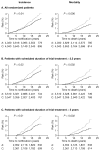Aspirin in the chemoprevention of colorectal neoplasia: an overview
- PMID: 22084361
- PMCID: PMC3273592
- DOI: 10.1158/1940-6207.CAPR-11-0391
Aspirin in the chemoprevention of colorectal neoplasia: an overview
Abstract
Considerable evidence supports the effectiveness of aspirin for chemoprevention of colorectal cancer (CRC) in addition to its well-established benefits in the prevention of vascular disease. Epidemiologic studies have consistently observed an inverse association between aspirin use and risk of CRC. A recent pooled analysis of a long-term posttrial follow-up of nearly 14,000 patients from four randomized, cardiovascular disease prevention trials showed that daily aspirin treatment for about five years was associated with a 34% reduction in 20-year CRC mortality. A separate metaanalysis of nearly 3,000 patients with a history of colorectal adenoma or cancer in four randomized adenoma prevention trials showed that aspirin reduced the occurrence of advanced adenomas by 28% and any adenoma by 17%. Aspirin has also been shown to be beneficial in a clinical trial of patients with Lynch syndrome, a hereditary CRC syndrome; in those treated with aspirin for at least two years, there was a 50% or more reduction in the risk of CRC commencing five years after randomization and after aspirin had been discontinued. A few observational studies have shown an increase in survival among patients with CRC who use aspirin. Taken together, these findings strengthen the case for consideration of long-term aspirin use in CRC prevention. Despite these compelling data, there is a lack of consensus about the balance of risks and benefits associated with long-term aspirin use, particularly in low-risk populations. The optimal dose to use for cancer prevention and the precise mechanism underlying aspirin's anticancer effect require further investigation.
©2011 AACR.
Figures



References
-
- GLOBOCAN 2008. Feb 2, 2011. p. 2011.
-
- Rex DK, Johnson DA, Anderson JC, Schoenfeld PS, Burke CA, Inadomi JM. American College of Gastroenterology guidelines for colorectal cancer screening 2009 [corrected] Am J Gastroenterol. 2009;104:739–750. - PubMed
-
- Screening for colorectal cancer: U S Preventive Services Task Force recommendation statement. Ann Intern Med. 2008;149:627–637. - PubMed
-
- National Comprehensive Cancer Network. Colorectal cancer screening. V1, 2010. Vol. 2011. Feb 2, 2011.
-
- Flossmann E, Rothwell PM. Effect of aspirin on long-term risk of colorectal cancer: consistent evidence from randomised and observational studies. Lancet. 2007;369:1603–1613. - PubMed
Publication types
MeSH terms
Substances
Grants and funding
LinkOut - more resources
Full Text Sources
Other Literature Sources
Medical

